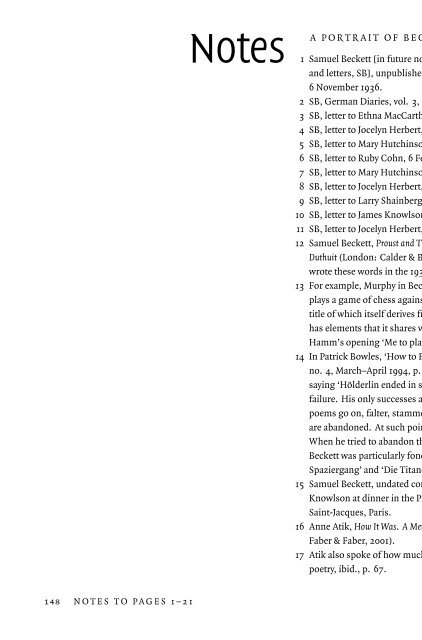You also want an ePaper? Increase the reach of your titles
YUMPU automatically turns print PDFs into web optimized ePapers that Google loves.
148 NOTES TO PAGES 1–21<br />
Notes<br />
A PORTRAIT OF BECKETT<br />
1 Samuel <strong>Beckett</strong> [in future notes referring to diary entries<br />
and letters, SB], unpublished German Diaries, vol. 2,<br />
6 November 1936.<br />
2 SB, German Diaries, vol. 3, 31 December 1936.<br />
3 SB, letter to Ethna MacCarthy, 10 January 1959.<br />
4 SB, letter to Jocelyn Herbert, 12 June 1972.<br />
5 SB, letter to Mary Hutchinson, 24 August 1972.<br />
6 SB, letter to Ruby Cohn, 6 February 1977.<br />
7 SB, letter to Mary Hutchinson, 6 February 1977.<br />
8 SB, letter to Jocelyn Herbert, 15 May 1977.<br />
9 SB, letter to Larry Shainberg, 7 January 1983.<br />
10 SB, letter to James Knowlson, 20 May 1981.<br />
11 SB, letter to Jocelyn Herbert, 11 January 1981.<br />
12 Samuel <strong>Beckett</strong>, Proust and Three Dialogues with Georges<br />
Duthuit (London: Calder & Boyars, 1970), p. 11. <strong>Beckett</strong><br />
wrote these words in the 1931 first edition <strong>of</strong> Proust.<br />
13 For example, Murphy in <strong>Beckett</strong>’s novel <strong>of</strong> that name<br />
plays a game <strong>of</strong> chess against Mr Endon and Endgame, the<br />
title <strong>of</strong> which itself derives from chess terminology, also<br />
has elements that it shares with the game, for example,<br />
Hamm’s opening ‘Me to play.’<br />
14 In Patrick Bowles, ‘How to Fail’, PN Review 96, vol. 20,<br />
no. 4, March–April 1994, p. 20, Bowles quotes <strong>Beckett</strong> as<br />
saying ‘Hölderlin ended in something <strong>of</strong> this kind <strong>of</strong><br />
failure. His only successes are the points where his<br />
poems go on, falter, stammer and then admit failure, and<br />
are abandoned. At such points he was most successful.<br />
When he tried to abandon the spurious magnificence.’<br />
<strong>Beckett</strong> was particularly fond <strong>of</strong> Hölderlin’s ‘Der<br />
Spaziergang’ and ‘Die Titanen’.<br />
15 Samuel <strong>Beckett</strong>, undated conversation with James<br />
Knowlson at dinner in the PLM hôtel, boulevard<br />
Saint-Jacques, Paris.<br />
16 Anne Atik, How It Was. A Memoir <strong>of</strong> Samuel <strong>Beckett</strong> (London:<br />
Faber & Faber, 2001).<br />
17 Atik also spoke <strong>of</strong> how much <strong>Beckett</strong> admired Heine’s<br />
poetry, ibid., p. 67.<br />
18 Samuel <strong>Beckett</strong>, conversation with James Knowlson,<br />
13 April 1983.<br />
19 Bowles, ‘How to Fail’, p. 17.<br />
20 All <strong>of</strong> these quotations are taken from Lawrence Harvey’s<br />
notes on his conversations with <strong>Beckett</strong> on 7 November<br />
1961, 22 February 1962 and 19 March 1962. The notes<br />
are preserved at Dartmouth College, New Hampshire.<br />
21 These extensive notes made by <strong>Beckett</strong> in the early 1930s<br />
on his readings <strong>of</strong> histories <strong>of</strong> philosophy are now at<br />
Trinity College, Dublin, with copies in the archive <strong>of</strong> the<br />
<strong>Beckett</strong> International Foundation at the University <strong>of</strong><br />
Reading.<br />
22 See Atik, How It Was, pp. 7–11.<br />
23 SB, letter to Tom MacGreevy, 18 January 1937.<br />
24 SB, letter to James Knowlson, 28 October 1976.<br />
25 SB, letter to Tom Bishop, 20 March 1973.<br />
26 MS 2901, archive <strong>of</strong> the <strong>Beckett</strong> International<br />
Foundation, University <strong>of</strong> Reading.<br />
27 In 1931 <strong>Beckett</strong> wrote to Tom MacGreevy: ‘I read two<br />
books <strong>of</strong> Powys: Mark Only and Mr Tasker’s Gods not<br />
knowing his work at all, and was very disappointed.<br />
Such a fabricated darkness and painfully organised<br />
unified tragic completeness. The Hardy sin caricatured.’<br />
SB, letter to Tom MacGreevy, 8 November 1931.<br />
28 See also Alain Badiou’s interesting discussion <strong>of</strong> this<br />
and other positive features <strong>of</strong> <strong>Beckett</strong>’s writing in his<br />
book, <strong>Beckett</strong>. L’increvable désir (Paris: Hachette, 1995).<br />
29 Nancy Cunard described <strong>Beckett</strong> in 1956 as looking ‘like<br />
a magnificent Mexican sculpture now’. Anne Chisholm,<br />
Nancy Cunard (Harmondsworth: Penguin, 1981), p. 400.<br />
30 SB, letter to Alan Schneider, 15 July 1967.<br />
31 SB, letter to Nick Rawson, 1 March 1970.<br />
32 SB, letter to Jocelyn Herbert, 3 October 1966.<br />
33 SB, letter to Judith Schmidt, 27 April 1965.<br />
34 Samuel <strong>Beckett</strong>, ‘Draff’ in More Pricks than Kicks<br />
(1st edition, London: Chatto & Windus, 1934; London:<br />
Calder & Boyars, 1970), p. 204. The quotation is used<br />
twice in Dream <strong>of</strong> Fair to Middling Women and also in Watt.


